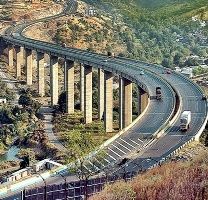On roads and railways, its approach so far is confusing
 It is rapidly becoming clear that while building infrastructure is a major focus for this government, the principles underlying its policy push for the sector are yet to become flawless or consistent.
It is rapidly becoming clear that while building infrastructure is a major focus for this government, the principles underlying its policy push for the sector are yet to become flawless or consistent.
For example, it has been reported that the road transport minister, Nitin Gadkari, has signalled his intent for the National Highways Authority of India, or NHAI, to be reduced in independence.
The head of the NHAI, he has reportedly suggested, should be more directly supervised by the road transport secretary.
Similar wing-clipping is in store for the board of the apex highway-builder.
In other words, the corporatisation of the Centre’s premier road-builder is being reversed, even at a time when more and more investment is going to flow through the authority.
But is the structure of the NHAI at the top really the problem?
And if so, is less independence the answer?
Corporatisation of the NHAI was one of the achievements of the last National Democratic Alliance government.
Road-building was given firm financial and institutional footing.
Is that being reversed?
It is worth noting that, meanwhile, this government has failed to speed up matters on the execution side of road-building.
Although many more projects were awarded in the National Democratic Alliance’s first eight months in office than in the equivalent months under the previous government, far fewer kilometres saw work start between June 2014 and January 2015 than in the equivalent period under the previous government.
Thus, there are open questions about the ability to implement what is decided at the higher levels.
Given the approvals process is going strong, it does not seem immediately likely that the bottleneck lies at the level of the board or the chairman.
Surely, the structure of the authority is what needs addressing. But there does not seem to be any careful thinking about that.
Meanwhile, changes are also being recommended to the Indian Railways.
A committee headed by economist Bibek Debroy, now a member of the National Institution for Transforming India Aayog, has made several recommendations.
Among its suggestions are that the railways move towards privatisation of their ‘rolling stock’ -- the wagons and carriages that run on the tracks.
This has understandably given rise to the impression that private companies will swiftly be permitted into profitable operations, while the public sector struggles to maintain the required infrastructure.
This has elements of the unsuccessful privatisation efforts in the United Kingdom.
In general, it is surely the case that corporatisation, but not privatisation, is the way forward for the railways.
As two committees, in 2001 and 2014, headed by Rakesh Mohan have separately suggested, separating the policy functions from implementation functions of the railway brass and reforming the accounting of the Indian Railways to bring it closer to that of regular businesses are necessary.
In fact, the push to highway-building that came about following the corporatisation of the NHAI should serve as a lesson to the designers of the railways’ future.
What is being shown up is that the Modi government is struggling to evolve a rational and consistent approach to the building of India’s infrastructure.
This is unfortunate, given that there is not much time to put the processes in motion.
It is also puzzling, given that in both these sectors, the previous exemplars and the road map reports already exist.











